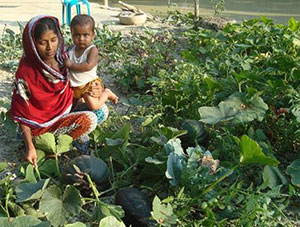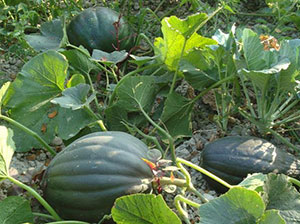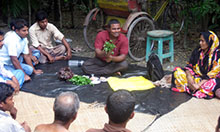One Woman’s Story of Improved Nutrition and Additional Family Income

Parvin Begum, mother of an eight-month-old child, lives in the small village of Purba Kawnia, situated in the southern part of Barisal division in Betagi upazila with her husband and her in-laws.
Parvin’s husband, Sabuj Hossen, is a day laborer who usually works in the brick fields and paddy fields when work is available. He was the only earning member of the family, and he found it very difficult to support the family on his low income.
In October 2014, Parvin, then a lactating mother, enrolled in one of the Farmer Nutrition Schools (FNS) organized by the USAID SPRING project. She has never missed an FNS session. In addition to completing lessons on vegetable gardening, she learned about the importance of continued breastfeeding and consuming animal source foods, including eggs and meat for her young child’s growth and development.
“From FNS sessions, I learned how to prepare the improved hajol [a traditional brooding nest used for poultry rearing] where food and water is available for the broody hen. After making it, I started to have my hen hatch in that way SPRING taught me,” Parvin says.
I will never buy poultry from the market; rather, I will rear local poultry in my household for getting safe meat, and it will also keep my son healthy.
- Parvin Begum
Now she is cultivating Indian spinach, bottle gourd, and sweet gourd, among other varieties promoted by SPRING. Equipped with skills in food production and new knowledge of better nutrition practices, she has been able to transform her homestead space into a bountiful garden full of nutritious vegetables. Her garden has also become a source of income. Last winter, Parvin grew red amaranth, radish, and knolkhol (German turnip). Even after consumption by the family, she still had enough vegetables left over to sell and make a profit.

Although Parvin’s family owns very little land, she is also cultivating sweet gourd and bottle gourd in the fallow land near the road. With more than a hundred sweet gourds remaining in the field, she plans to continue selling sweet gourds to help meet her financial demands.
Thanks to the FNS sessions, Parvin has an improved knowledge about preparing garden beds, pits, and other techniques for increased vegetable production. She has also changed some eating habits of the family by ensuring that all members are consuming different types of vegetables and that she and her young child are eating more fish or egg to stay healthy. Sweet gourd, for example, is known to be high in vitamin A, vitamin C, and beta carotene, as well as being a highly enjoyed vegetable in the Bengali home.
Parvin is now a more confident wife and mother. She has learned valuable lessons that have helped contribute to the household income and that keep her family healthy. “From now on I will cultivate vegetables, rear poultry, and harvest fish in my own home space instead of purchasing these things from the market."
[…] I have a positive path to earn something, while also fulfilling my family’s nutrition requirements.
- Parvin Begum
Parvin is one of 101,245 women who have benefited from SPRING’s 5,141 farmer nutrition schools across 40 upazilas in Barisal and Khulna divisions in Bangladesh. Each has gained insights into new ways to improve her and her family’s’ life through simple but demonstrably better approaches to household agriculture, hygiene, and nutrition.
